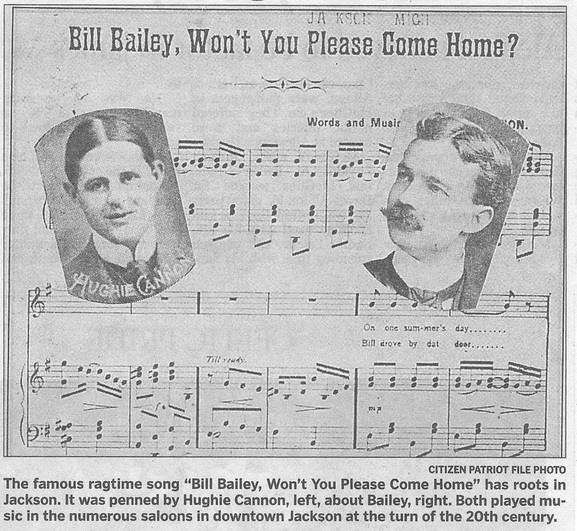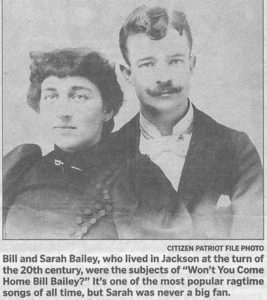
City of Jackson – Music History
From the early days, the city of Jackson has supported music. Some of the early arts were fine musical arts, others were not quite as polished. Listed below are opportunities to hear outstanding music this year, performed by outstanding musicians.
‘Bill Bailey, won’t you please come home’
An Early 20th century classic with Roots in Jackson
A musical gem endures
By Ken Wyatt
JACKSON CITIZEN PATRIOT
Day: Saturday Date: 3/19/2011
Section: Local Page: 4 Edition:
Hugh Cannon and Willard G. Bailey gave America one of its most enduring musical gems.
But they’re better known in ragtime history as Hughie Cannon and Bill Bailey — drinking buddies more than a century ago in the saloons of Jackson.
“Bill Bailey, Won’t You Please Come Home?” was a raw-and-rhythmic ragtime song that brought Cannon and Bailey fame in the early 20th century. Composed by Cannon, the lyrics are timeless — a musical caricature of a marriage between a young girl and her wandering husband.
The song has been recorded by Louis Armstrong, Patsy Cline, Bobby Darin, Pete Fountain, Wayne Newton, Al Hirt, Brenda Lee, Ella Fitzgerald, Jimmy Durante, Phish, Harry Connick Jr., Lena Horne, Michael Buble, Della Reese and countless others.
It also has been highlighted in such films as Francis Ford Coppola’s “The Conversation” in 1974 and the “The Last Unicorn” in 1982. It’s been in a “West Wing” TV episode, and even in “The Simpsons.” The episode featured Abe Simpson posing as a female cabaret singer, performing it for Adolf Hitler in a dream sequence.
But before “Bill Bailey” made musical history, it was a real-life story, set in old Jackson.
Turn-of-the-century Jackson was a wild, untamed railroad town sometimes called “Little Chicago.” The Michigan Central Railroad had repair shops here, and in 1900, about 3,000 rail crew members called it home.
With so many railroad men here, saloons did a brisk business. Jackson’s 1900-01 city directory listed almost 75 of them, mostly clustered along Main, Cooper, Francis, Mechanic, Pearl and Cortland streets.
Accounts differ as to which saloon witnessed the birth of “Bill Bailey.” It’s usually identified as Conrad Diedrich’s saloon, 213 E. Main St. (now E. Michigan Avenue). It was a men-only place, one of the few in Jackson with a piano. Hughie Cannon, then in his early 20s, was a piano man there.
In a 1973 feature, Detroit writer James Treloar sketched a graphic portrait of Diedrich’s: “Men could get beer for 5 cents a pint, bar whiskey right out of the barrel for 10 cents, listen to a drifter named Hugh Cannon pound the piano keys, and later on begin eyeing the bawdy house upstairs over the grocery across the street.”
Another account, by Citizen Patriot reporter Don Durst in 1966, highlighted quotes from various people who knew Cannon:
“Hughie was liked by everyone who met him.”
“As a ragtime pianist, he was out of this world.”
“He will be out on the street singing after the saloon is closed and probably be in jail before morning. During the night, he will write a song and the music for it. What a gift!”
Wherever “Bill Bailey” was written, Cannon was a familiar presence in Jackson’s saloons. And whether it was at Diedrich’s, Carroll’s or “The Snug” on Cooper Street, Cannon became good friends with Bailey.
Bailey’s father ran Bailey’s photographic gallery on Main Street near Diedrich’s saloon. Young Bill, as he was known, had no interest in photography. He worked as music teacher by day and a dance-hall musician by night.
Bailey married Sarah Siegrist in 1893, and she outlived the man by many years. In 1973 she told a reporter, “Bill was my sweetheart, but he was everybody else’s, too. He lied to me all the time, but I was too young to understand much then. I was a country girl.”
At some point, Bailey told Cannon about his marriage. Cannon was inspired to write a song with lyrics loaded with enough graphic allusions to make it clear this was a pathetic union. The wife, battered by her man, “bellers” out, “Bill Bailey, won’t you please come home?”
Bailey always maintained the song was a joke. Sarah never quite saw the humor.
“I liked the music,” she later said, “but I thought the words lowered him.”
In 1902, Hughie Cannon sold the song to a New York publisher for $350. And the rest is ragtime history.
The song soared in popularity. And there were others: “Just Because She Made Dem Goo-Goo Eyes,” “I Hates to Get Up Early in the Morning,” and “He Done Me Wrong.”
But beyond his music, the little man with the whimsical grin plumbed the depths of personal tragedy. Cannon married Emma Dorsam in 1906, but they were together only two years before separating.
When Emma filed for divorce, she affirmed, “For a period commencing about a month after our marriage and continuing to the time of our separation, defendant was drunk nearly every night; he seldom if ever remained at home to spend the evening but would consort with people of evil repute and would generally come home about 2 or 3 o’clock in the morning in a drunken condition.”
Cannon, interviewed by a Detroit newspaper reporter who found him in a Detroit poorhouse in early 1909, said of his drinking:
“I started when I was 16, and except for seven months on the wagon, I’ve been pickled most of the time. Twenty black, nasty, sick years.”
Cannon died in Toledo’s Lucas County Hospital, on June 17, 1912. He was only 34.
Cannon’s mother had his body brought to her home in Connellsville, Pa., where it remains interred. The man who became famous for his musical joke about a wandering husband had, in fact, finally gone home.

Tidbits
* Bill and Sarah Bailey stayed in Jackson after Hughie Cannon left. Bill ran a music store for several years. Then, in 1910, the couple moved to the West Coast, where he played in orchestras and taught music. Sarah divorced Bill in the 1940s after 30 years of marriage and moved to Oregon, where she married Calvin Williams. After Williams’ death, Sarah returned to Jackson to live with relatives. She lived out her final days at the now-closed Cedar Knoll Rest Home, dying at age 104 in 1978.
* A 2006 feature story in the Pittsburgh Tribune-Review reported that there had been efforts for years to get an historic marker approved for Hughie Cannon at his Connellsville, Pa., burial site. State officials would not approve one because Cannon’s story was considered not unique, but typical for his era.
* In 1966, Citizen Patriot reporter Don Durst wrote a nine-part series about “Bill Bailey” and the various people who were part of the story. One of the stories he related was told by Rolla Johnson, who said, “Hughie used to play in Steve Carroll’s saloon as well as Diedrich’s. I wasn’t more than 7 years old at the time and sold newspapers in the saloons.”
The song
“Bill Bailey, Won’t You Please Come Home?” (1902), by Hughie Cannon:
On one summer’s day Sun was shining fine,
The lady love of old Bill Bailey was hanging clothes on de line
In her back yard, and weeping hard;
She married a B. and O. brakeman, Dat took and throw’d her down,
Bellering like a prune-fed calf, wid a big gang hanging ’round;
And to dat crowd, She yelled out loud:
Won’t you come home, Bill Bailey, won’t you come home?
She moans de whole day long;
I’ll do de cooking, darling, I’ll pay de rent;
I knows I’ve done you wrong;
‘Member dat rainy eve dat I drove you out,
Wid nothing but a fine tooth comb?
I knows I’se to blame; well, ain’t dat a shame?
Bill Bailey, won’t you please come home?
Bill drove by dat door, In an automobile,
A great big diamond, coach and footman, hear dat big wench squeal:
“He’s all alone,” I heard her groan;
She hollered thro’ that door, “Bill Bailey, is you sore?
Stop a minute; won’t you listen to me? Won’t I see you no more?”
Bill winked his eye, As he heard her cry:
Won’t you come home, Bill Bailey, won’t you come home?
She moans de whole day long;
I’ll do de cooking, darling, I’ll pay de rent;
I knows I’ve done you wrong;
‘Member dat rainy eve dat I drove you out,
Wid nothing but a fine tooth comb?
I knows I’se to blame; well, ain’t dat a shame?
Bill Bailey, won’t you please come home?